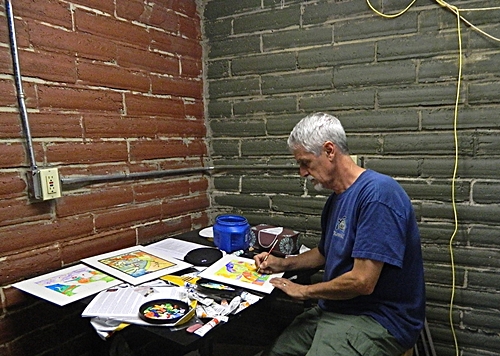
What’s your background?
I was born in Oxnard California. After the death of my birth mom I lived on a small farm in El Rio, California with my brother Rob (Also an artist) and my grandparents. My father remarried and my brother and I moved to Ventura, where we were raised.
Ventura could be described as a typical Southern California beach town, north of Los Angeles. I attended Ventura Community College and there met the artist Gerd Koch. Gerd was an outstanding art teacher but even more important to me an excellent and influential artist.
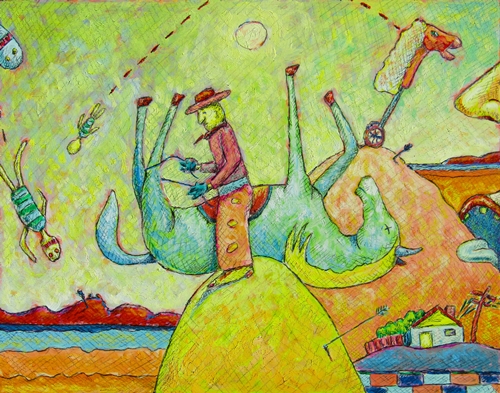
I transferred to Central Missouri state University and majored in art education. A few years after completing the degree I returned to CMSU and did a MA in painting. My most influential instructor there was Margaret (PEG) Peterson, she was a brilliant, all be it, slightly crazy artist. After that for the next several years I taught art in a variety of locations and painted and showed as much as possible.
In 1989 I returned to school once again, this time to the University of Kansas. There I majored in both drawing and painting and completed my MFA in 1991.
Since then, I have taught art and pursued both painting and exhibiting. As of this time my work has been published in over 100 magazines and journals and my work has been shown in 51 solo exhibits. My work can be found in several private collections as well as being in the collections of, Cosumnes River College, Sacramento, Ca. Laredo College, Laredo Texas, The Museum of Wild and Newfangled Art, New York, Siskiyou Museum of art, Siskiyou, Ca., Truckee Meadows College, Reno Nevada, Imperial Valley College, Imperial, Ca. Museum of Northern California Art, Chico , Ca. Maturango Museum, Ridgecrest, Ca. Central Missouri State University, Warrensburg, Mo. And Art City, located in Ventura, Ca.
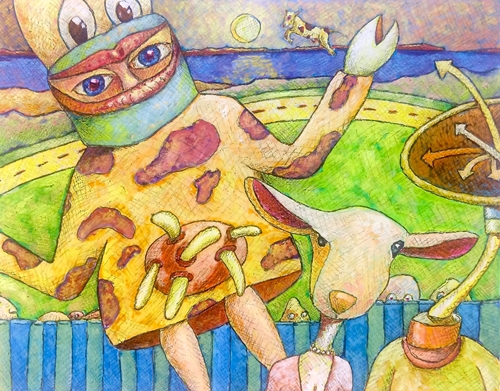
I live in Fair Oaks, Ca. with my wife, two children, two dogs, three chickens and one lizard, where I continue to paint and at least for a little while more teach art for a living.
Does your art come from that background?
Short answer to that question would be yes. I feel that the artist should mostly focus on what they have had a personal connection with, be it background experiences or just an interest in. I my case it is the combination of being raised in a suburban environment, my first memories coming from a small farm and my rather intense interest in the origins and functions of art.
What are you trying to say with your work?
It is my desire to record my personal journey from an emotional, psychological and intellectual perspective and perhaps make connections with others who have had similar experiences. I believe we are just one small step from the cave, we are slaves of biology, unable to escape our past. We want to evolve and spend a great deal of time telling ourselves we have done so, while at the same time often behaving in ways that could only be described as primitive. This inner turmoil between our biological self and our perceived or hoped for image of our self is where my work attempts to hang out.
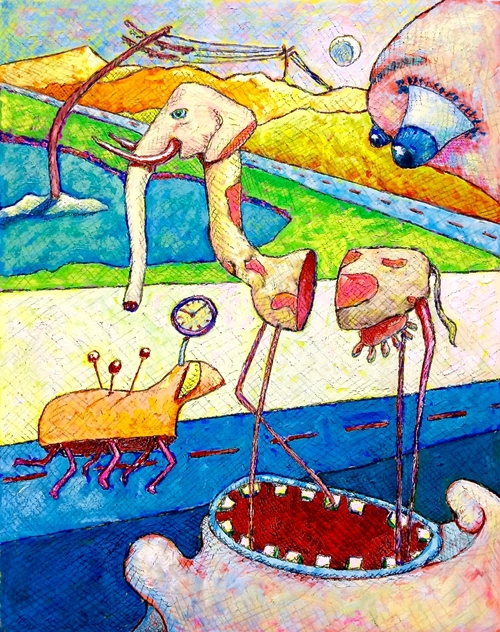
Who are your biggest influences?
Personal and direct influences would be Gerd Koch (Abstract Impressionist), Margaret Peterson (Once described in a review as “The crazy lady of the Midwest”.) and Nick Vacarro (Hard edged abstractionist who also created toys under the name Hans Hupp.) As far as famous artist are concerned I have always enjoyed Van Gogh, Picasso, Nolde and Soutine. Artist that break the mold and set off in their own direction have always been my favorite.
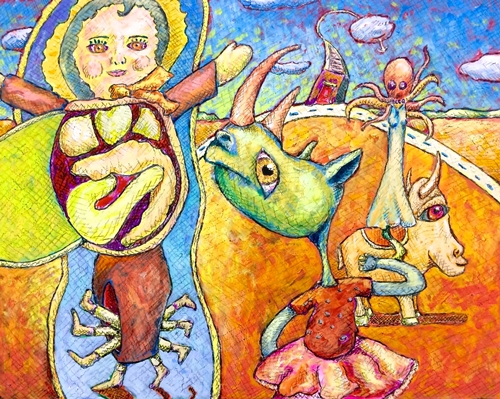
What is your favourite piece of work by yourself?
This answer can change rapidly but currently I would say “Era of the End”. This features a hippo with a staircase coming out of their mouth. Is the staircase inviting or threatening? This depends on the viewers thoughts and experiences but the ambiguity created is what I like about the work. I prefer art that does not contain all the answers.
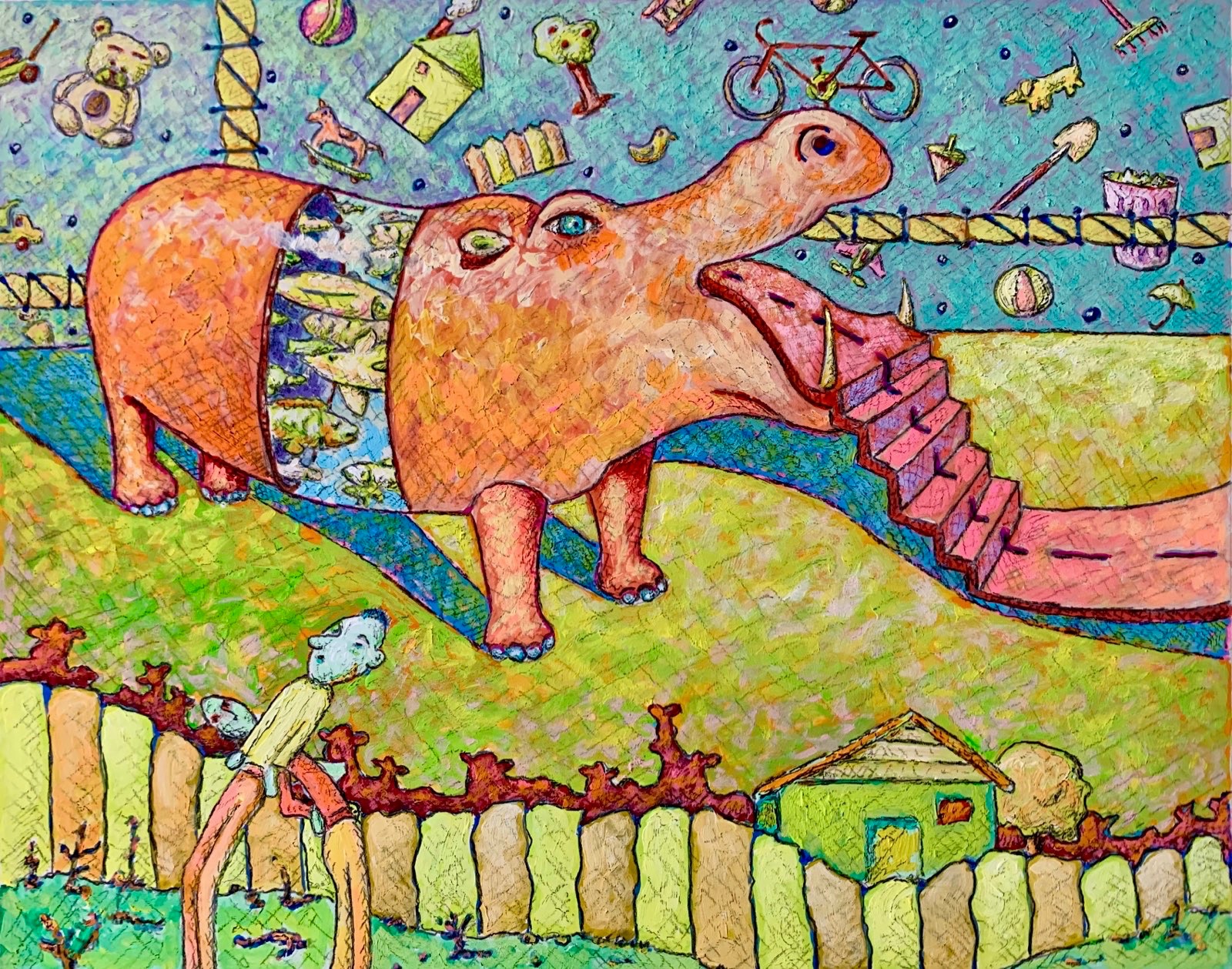
How much time (On average) does it take to complete a work?
Most of the time it takes about two weeks from the start of a painting to the completion of the work. Drawings take only one or two days.
How do you know something is “finished”? Is it easy to walk away?
When I feel a work is finished, it is. I do allow a one day break just to think about and analyze a work to confirm it’s completion prior to starting the next work. I normally have three or four works ready to start so walking away from a work is no problem, I’m ready to move on to the next piece.
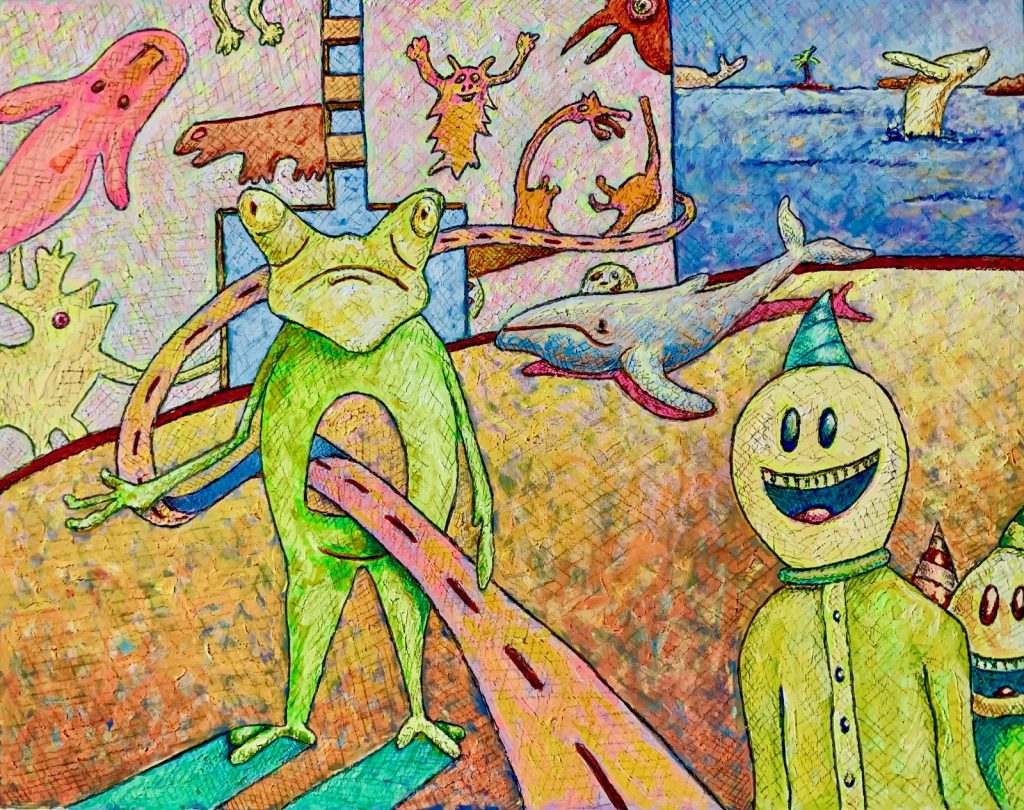
What project are you working on now?
Currently I’m trying to complete a painting I call “The Personification of Stress”. I have a pile of six paintings ready to go as soon as I finish so hoping that I finish soon!
What are you personally doing to advance your work career?
I keep a lot of pans in the fire so to speak. I usually have at least six proposals out at any given time. I keep enough framed work nearby to do at least two shows at any given moment. This enables me to take advantage of any last minute opportunities that might occur. Currently I’m awaiting a final date for a solo exhibit down in Southern Ca., it should be fairly soon.
How do you price your work and why do you price it that way?
I view a lot of art created by artist of similar experience who work in like sizes and materials and take that as my price jumping point.
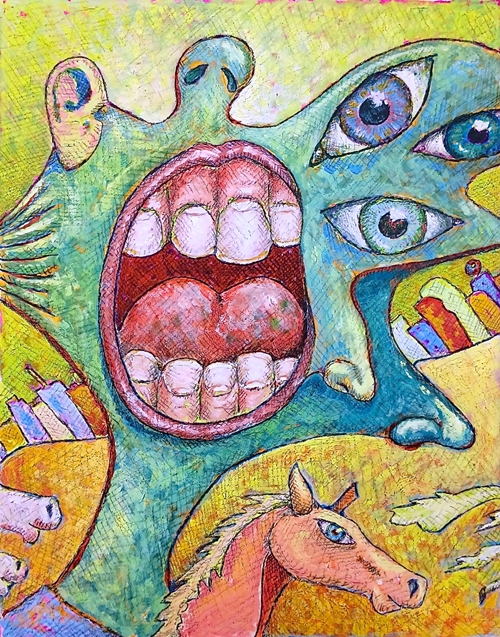
What made you choose the medium you work with?
I started out as an oil painter but lost my sense of smell to turpentine. I was afraid this was not a good sign health wise so I switched to acrylic. I was not totally happy with the gloss of the paint and discovered gouache. Gouache was awesome but the chance of cracking worried me. I started to work on board and found a new type of paint that had the look of gouache and the flex of acrylic. I have worked in the medium, adding black colored pencils to it for the last 19 years.
Do you work in a studio?
Yes I do!, I have not had a studio for quite awhile prior to this one and so had to work in a variety of strange places, including my car. My studio is a converted bomb shelter and so it has little natural light. Aside from that it is a great space!
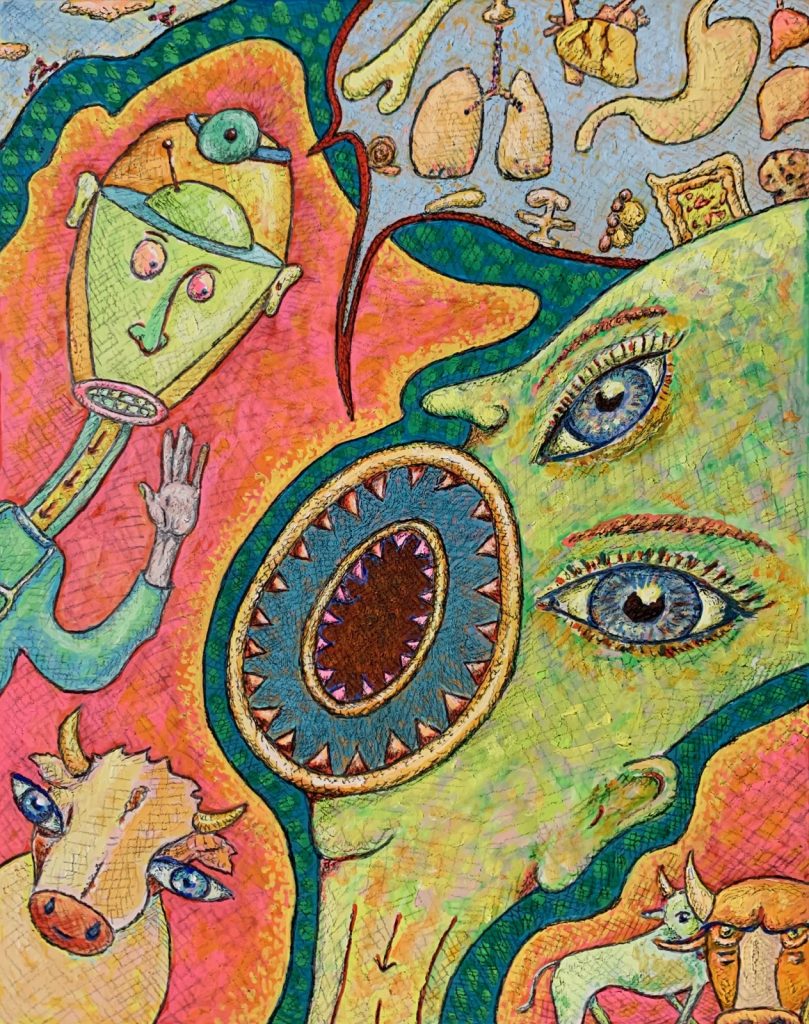
What is the one thing in your studio you could not be without?
Having gone for years without a studio I can tell you there is very little you cannot go without aside from art supplies. However the item I most love in my studio is my drawing table, it is a luxury to have such a nice surface to work on!
This was given to me by the artist Gerd Koch, “Never allow yourself to lose your sense of play. Play is the wellspring of creativity and when you become too serious it will dry up.”
What was the first piece of art you sold?
Hard question to answer as I don’t remember. I can tell you the first work I sold to a stranger was called “Big Blue Pig”, which was just that! It sold to Margaret Thatcher… ok, not the Prime Minister, but a lady living in Ojai, Ca. who owned and operated a private school.
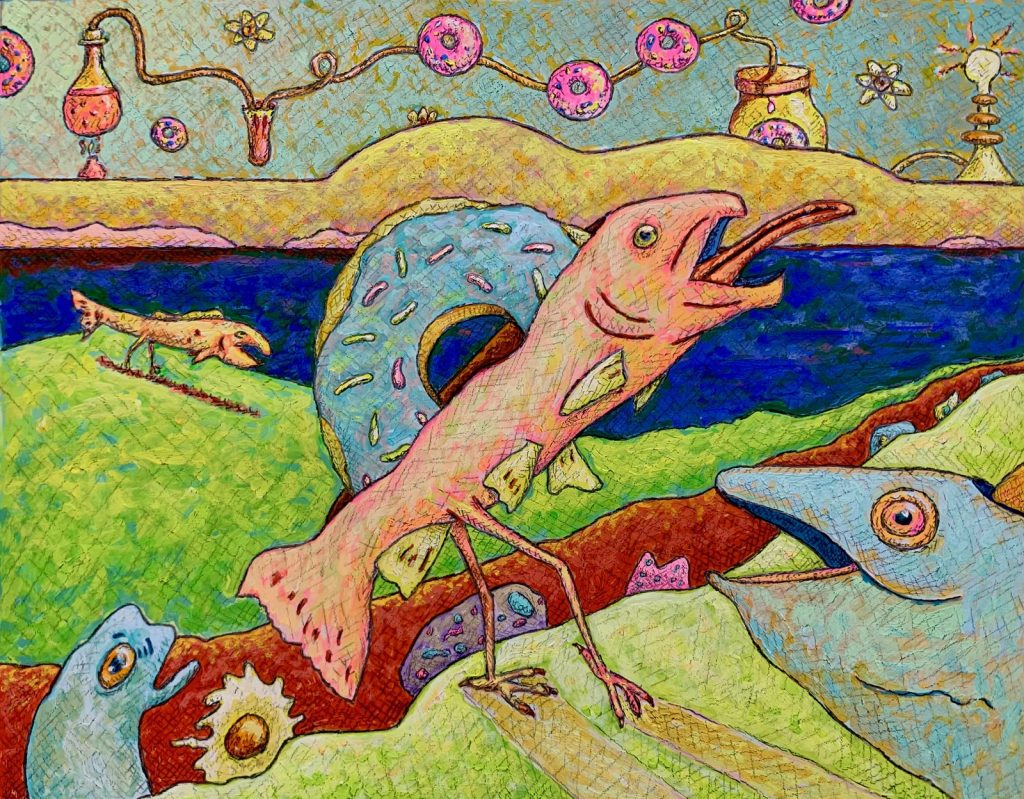
Do you find it hard to navigate the art world?
For the most part no. Making proposals, approaching galleries or art spaces has been made far easier through the computer. I can put together an exhibition proposal in a fraction of the time it use to take with slides and hard copy. The only confusing part is the computer itself, seems as if it is always changing and there are times I feel Like a very slow moving dinosaur trying to keep up.
 |
Do you use social networking in your day to day life?
I honestly am not up on social networking so I would have to say no. I do have the address from pixels Ronald-walker.pixels.com.
Is there anything that annoys you about the art world?
For me at least I view art as being about communication and expression. I think there is an over emphasis on the financial aspects of art. Normally it does not bother me unless it seems to overwhelm the real purpose of art.
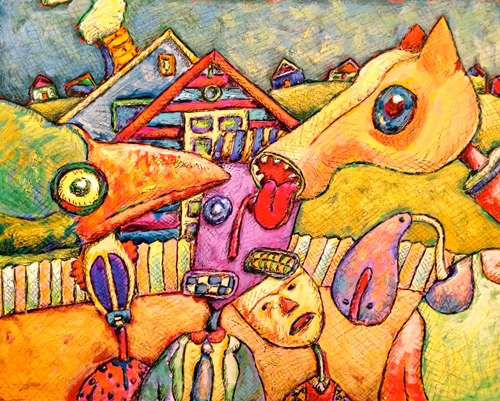
What advice would you give new artists?
Try to work on your art on a daily basis, whether you are in the “mood” or not it is creating a habit. Even if you have days where you do very little at least you did something. Think of it as waves on the sand, a little each day and you will get things done.
Have you got hobbies?
I like hiking, getting out in nature, animals, reading about science and crypto-zoology and playing basketball.
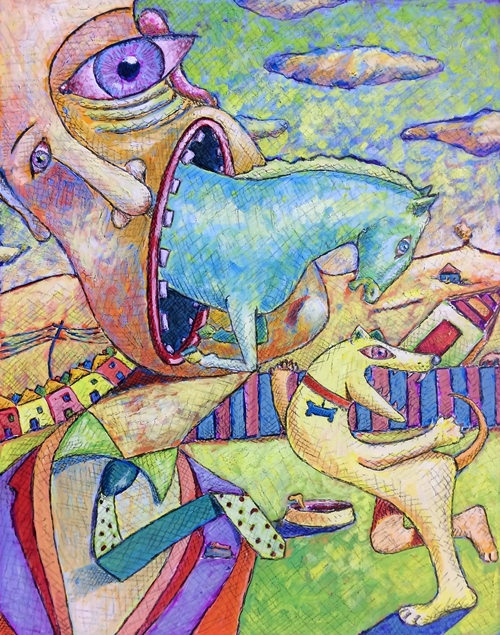
One final note I do not view art as a luxury or a frivolous extra that humans participate in. I view art as being part of the core of mankind, vital to survival. The purposes and uses of art are varied and numerous but here are a few I consider particularly important.
Art serves as a form of nonverbal communication.
Art transcends the limitations of the written or spoken language. For example; you may not speak French but you can understand the communication being expressed in a French painting. The second major advantage of the visual arts as a form of communication is it’s immediacy. A lecture, book, movie, piece of music all contain wonderful and various amounts of communication but it takes time to have this information delivered to you. The visual arts, such as painting, presents the information to you all at once.
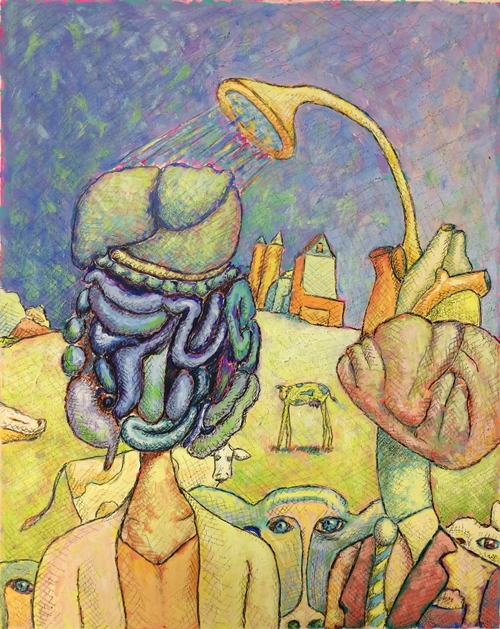
In this day of age where we have weapons capable of destroying the world anything that aides in our understanding of other people and cultures is vital to our continued survival.
Art aides in our sense of community , one theory as to why our species came out on top over the physically stronger Neanderthal was our heightened ability to work together which was aided by art. The visual image or symbol helped tie groups together into what might be called giant families. Belonging to and identifying with a larger group would be a major advantage survival wise. Rather than doing everything yourself now you could have specialist who might do certain task better than other individuals. This would create trade which would further the development of societies and cooperation from group to group.
The use of the visual image is still used today to group people together whether it is the flag of a particular country, uniforms, sports paraphernalia or whatever.
To sum up the survival feature, if you are a Neanderthal and you only have your immediate family you would have no chance when confronted by large numbers of opponents cooperatively working against you.
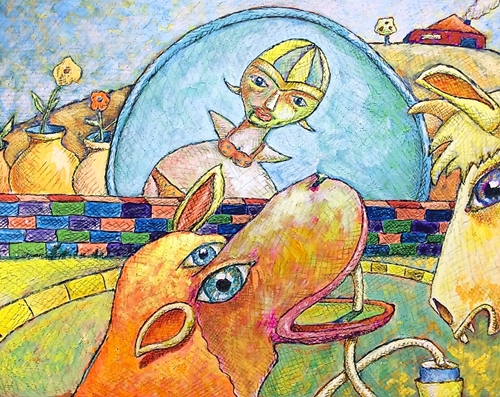
Lastly, through the through the development and enhancement of creative thought, the visual arts have been shown to strengthen problem solving and critical thinking skills, it encourages innovative thought. It helps create people who seek new ways of solving problems and not just people who follow directions. Innovative creative thinking is the primary ingredient in human progress and invention, society would stagnate or disappear without it.
Art is not a frivolous luxury but rather the glue that holds society together and the grease that keeps it moving forward.
Ronald walker


To me most of the paintings fitting for the psyche of modern man. The paintings often have an elements of frightening content I feel. but yes they cause me to feel. In short it he work is pictures of insanity. A nightmare compounded. Perverted and the opposite of wellness and humor. A horror film characterization similar to alien clowns or monster dolls.
Great Interview! Nice to get to know you a little better Ronald!